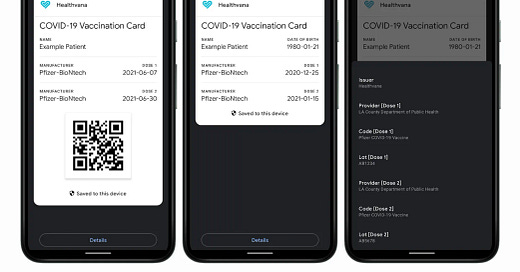2 July 2021
This is how your liberties evaporate. In the post-legislative world, changes to fundamental rights are made by stealth, fiat and, yes, through your apparent consent.
The government does not impose a vaccine passport, rather corporations offer it as a service. Corporations are not accountable because support will depend on vaccine providers. No-one forces you sign up, but you’ll need it for lots of things. So everybody’s hands are clean. Nobody imposes this on the people, even as it happens.
It’s not a Trojan horse because that would assume you voluntarily opened the gates. The corporations are using information you have given them in the past, data that is already on your phone and records held in state and corporate databases. Android contains a Passes API that works with scannable QR codes and it’s compatible with phones running Android 5.0 dating from 2014. That’s pretty much all Android phones in use.
This new vector of control appeared without any discussion in committee or upon the floor of parliament or congress. No bill was drafted, no legislation passed. Unless you count the Patriot Act and the myriad laws that allowed governments and corporations to snoop, gather and share your data. Corey Lynn of Coreysdigs.com has pointed out that the small print of the Immunization Infrastructure Modernization Act of 2021 stipulates support for policies that “facilitate complete population-level capture, consolidation, and access to accurate immunization information.” The Act proposes a technical team be commissioned (from the military industrial complex?) that would set the precise standards for contracts.
Rules are mandated, though they emerge first as options in the rich tapestry of consumer choice. For nearly 40 years we’ve been told, since the Reagan era and in the UK during the Thatcher premiership, about freedom of choice. Now we know why.
It grew out of free-market dogma, supposedly putting the customer in control — choosing schools, for instance — as a way to promote better services through competition. In practice it was an utter failure. It was a charade, providing cover for deregulation in which ever-greater power went to corporations and public private partnerships that shredded constitutional notions of accountability and even legal recourse.
There is a reason why it’s called the tyranny of choice. It let bureaucrats use the advertising techniques of focus groups and market testing to shape policy. Being easily manipulated these techniques became a backdoor for imposing agendas while claiming the people wanted them.
With the post-1970s invasion of government by the psychological, cognitive and social sciences they soon were using nudges and cues, linguistic programming, and emotional carrots and sticks to drive the herd in the desired direction.
Choice became an essential tool in the armory of bureaucrats and social engineers. It was choice stripped of free will. The choice of an animal pressing a lever in a cage.
ALL THAT GOOD STUFF
The Mockingbird media, either founded, financed by or cooperating heartily with the intelligence agencies (see Joel Whitney's Finks) presents the COVID Card as unalloyed yumminess – “all that good stuff,” in the Silicon Valley phrase. It’s surely little coincidence that Google used to name all of its Android versions after sugar fixes: marshmallow, KitKat, lollipop etc.
Verge, like Vox, Vice and the other infotainment sites, says it’s “good to see that Google is making it easier for people to save their vaccination status digitally” and it admits Google “will use some information”.
Verge concedes, misleadingly, that this includes things like when you use your COVID Card. In reality Google’s terms and conditions [1] say it will process:
Your identity, including personal and health information, and any numbers or cards.
Name of Covid shot, the lot and dose number, the date you received it, who jabbed you and any future appointments.
Entry eligibility, “If your corresponding government agency or authorized third party supports entry eligibility recommendation, this includes information on whether you’re cleared for entry and the date on which it expires.”
That’s very nearly a passport and easily converted into one. It also strengthens suspicions that despite the limitations of the Vaccine Adverse Event Reporting System VAERS, officials actually do want to monitor who got what shot and what happened to them.
GOING GOOGLE FREE
Privacy-conscious people do have some options. It seems you can’t opt out of contact tracing just by avoiding updating Android or Apple’s IOS as Google has decided to bolt the COVID Card onto an app that’s long been part of Android.
I just loaded a new operating system onto a Samsung S5 from 2014. It not only updated Android to the latest version but also cut many of the cords with Google.
How so, you rightly ask, since it still uses Android which Google developed. There are open-source versions of Android that are loosely tied to the Google ecosystem.
There are options to avoid Google entirely, like the Linux-based Purism and privacy-focused operating systems like Calyx and Graphene [2]. The latter can only be installed on high-end handsets.
Remember that privacy may give you limited anonymity. Security guards against intrusions. They are not the same thing. Nor is convenience.
This means some form of Android or IOS is unavoidable for most people. Your best option is a “custom ROM” (meaning read-only memory or firmware, aka the phone’s operating system) that cuts as many ties as possible with Google.
EVERYBODY LIKES TO PLAY
The Homer Simpson “duh” moment comes when, having installed a non-Google OS, you then use your Gmail address to log into to the Google Play Store to install your favourite apps.
There are several ways around this:
Go cold turkey and learn to live without them.
F-Droid and other app repositories have alternatives to most Google apps.
The microG project [3] seeks to minimize any data sent to Google.
That last option is the one I decided to try. It was founded by Marvin Wißfeld and receives some funding from the German authorities and his philosophy repays close attention. His motivation is to provide an escape from Google’s increasing focus on proprietary services, which are run on top of so-called service apps not visible to the end user. Wißfeld created an environment in which it is impossible for apps to discover if they are running over infrastructure provided by Google or microG. This allows Google-type apps to run independently of Google.
He does not come across as a rebel but rather an engineer anticipating a problem: The early Internet portals operated a walled garden where you signed up for their email and entered through their gate. Everything happened in their manicured yard. Google is like a vine that we let into our yard. Soon our garden will be over-run with invasive plants that, left untended, will take over every flowerbed as surely as bindweed or horsetail.
Any gardener who has fought the losing battle against predatory weeds knows that you can’t beat them entirely but you must never stop trying. Compromise is not an option.
Wißfeld has added support for the COVID contact tracing framework to microG. This suggests that the Passes API being used for COVID Card would be accommodated in the same way. In an interview with e.foundation in November 2020, Wißfeld says his contact-tracing app requires explicit user consent and does not share data with Google or Apple.
How it works is illuminating: Bluetooth broadcasts a rolling proximity identifier (RPI) but changes the number every 10 minutes, based on a private key that in turn is generated randomly once a day.
The phone scans every five minutes for local RPIs which it stores with a time stamp on the phone. If you choose to share your COVID status you do so via a private key which would be noticed by other phones using the same app. Phones would keep a tally of their owners’ “exposure” in terms of date and time, contact length and signal strength – but they could not learn identity or location.
This shows that a system geared to individual health is possible in the event of a real outbreak and reliable infection testing data. The fact that bureaucrats clearly are moving towards some kind of vaccine passport suggests they have other motivations.
If you want to take steps to minimize your links to Google, the most accessible and achievable measures involve custom ROMs like Lineage (formerly CyanogenMod). There is a version of Lineage with microG built in [4]. If you have a high-end phone and plan to cut all links with Google, Edward Snowden suggests you consider Graphene OS.
You will need to enable Developer Options (About phone > Build number), enable USB debugging, toggle on OEM Unlocking, root the phone (gaining top-level access), install a recovery system such as TWRP, wipe and format the phone, then copy a zip file of your chosen operating system to SD card/internal storage and install.
If technical computer work is not your thing, try using the local advertising methods. I’m sure there are people ready to do this. There is little chance of locking up or bricking a phone nowadays but if you don’t know someone you could start with an old Android you have lying around before entrusting them with your pride and joy. It is a good way to start building the networks we need.
LINKS
[1] Google: Add Your COVID Card
[2] Purism
[3] microG Project
[4] Lineage OS




